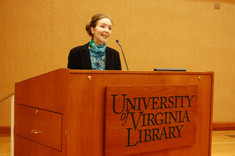 I’ve recently returned from the 20th Anniversary Virginia Festival of the Book in Charlottesville, where I spoke in the Harrison Institute Auditorium at the University of Virginia about my book, Julian’s Gospel. I was delighted to discover that even with the many book events going on simultaneously every day(over 200 authors are represented and some 20,000 attend the Festival), public interest in a fourteenth century English mystic pulled in three times the audience of most Festival book events. The hunger for "spiritual food" is alive and well in the land! Indeed, Julian’s Revelations about the unconditional love of Christ on the Cross seemed to be a major shock for many. The questions and comments showed that people are really concerned about guilt they’ve been carrying since their childhood and teenage years. Many grew up imbued with threats and fears of damnation by preachers and teachers, just as Julian must have been. And audience members seemed to hear the message of Christ’s compassion and unconditional love anew -- through Julian’s voice. Never Wroth Throughout her vivid experience of Christ suffering and dying on the cross, Julian of Norwich never once sees him wroth. That Old English word wroth connotes intense anger and moral indignation. Wroth was considered an attribute of God, an aspect of his righteousness through which he shows his Divine Justice and eternal glory. But Julian writes: “But in God may be no wrath, as to my sight.” And again: “… I saw truthfully that our lord was never wroth nor never shall be. For he is God, he is good, he is truth, he is love, he is peace. And his might, his wisdom, his charity, and his unity do not permit him to be wroth. For I saw truly that it is against the property of his might to be wroth, and against the property of his wisdom, and against the property of his goodness. God is that goodness that may not be wroth, for God is nothing but goodness.” We may wonder if Julian is stepping out on a theological limb here, in spite of her desire to remain a faithful daughter of Holy Church. But she is not. She is only stating, in no uncertain terms, what theology has ever taught and what she, personally, had experienced: that God is unchangeable and loving. He cannot have “mood swings” or exhibit raw emotions as human beings do. He does not wax pleased with the soul one minute and furious the next, like a volatile parent. God is not and can never be angry with us, even though we are sinners. The biblical allusions to God’s anger flaring out (and they are legion, from the Psalms, to the Book of Job, to the Book of Revelation) are metaphorical devices to drive home to humankind the gravity of its sinful deeds that defy God’s unchanging goodness. These depictions of the divine as wrothful are human projections of how we assume God must “feel” towards us -- like an angry parent -- when we, ourselves, are appalled and ashamed by our own misdeeds. Julian comes to understand that it is we who are angry because we make wrong choices and then have to suffer the inevitable consequences of those grave misdeeds. And then we project God as being wrothful. Sometimes we even lash out and blame God for all we have to suffer as a result of our sins. Instead of being angry at us, Christ withstands “with might and right” all that is against his Father’s will, but he does not condemn anyone in wroth, any more than he condemned the woman taken in adultery (Jn 8:1–11). And Julian sees that Christ doesn't blame us for our sinful deeds, either. As in the four canonical gospels, Christ repeatedly counsels repentance, faith, and the amendment of one’s life. Unchangeable Goodness Julian may not have known the theology of God’s unchangeable existence until she began to ask doctrinal questions of educated clerics in the time period after her Revelations. However, like all true mystics, she knew what she had experienced. And throughout her vision of the sufferings of Christ on the cross, she never saw him angry. He did not suffer in fury against a humanity that made him undergo such a cruel death. He endured his passion in unconditional love, without a single moment of condemnation. In fact, if we want to see what God’s supposed wroth looks like, we have only to contemplate the image of Christ hanging on the cross. It is the true image of God giving everything he is to save humanity from itself. When you take time to meditate on it, God’s unconditional love becomes much more overwhelming for the soul to realize and to accept than his supposed wroth. Always to be loved, in spite of everything, is a concept so vast and humbling as to defy human comprehension. Yet that is what Christ hangs on a cross to show us: even if we crucify him, he will still love us.
1 Comment
Jacqueline Marsh
4/7/2014 01:32:06 am
Thank you so much for this. It coincided with giving my 4th Lent session on that very topic in my course on Julian's Revelations at Emmaus House in Edinburgh. How fresh and new these insights still are, and what difficulty we have in really absorbing them.
Reply
Your comment will be posted after it is approved.
Leave a Reply. |
Archives
June 2024
-amazon.com/author/veronicamaryrolf
All text copyrighted © 2013-2018 by Veronica Mary Rolf. All rights reserved. No copying or reprints allowed without the express permission of the Author. |
 RSS Feed
RSS Feed
